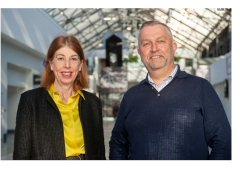It hardly seems any time since we were writing our last editorial, but the year continues to move on apace, so we are pleased to be sharing our latest thoughts with you. For many, especially in the northern hemisphere, summer is here, and, while some are sweltering in record high temperatures others (including those of us in the UK) are struggling with very changeable weather at the moment. But, as with the weather, it is these variations and changes that make our working lives endlessly fascinating and challenging.
When we wrote our last editorial, we were looking forward to bringing you a number of interesting articles, so it is a great pleasure to confirm that we have now published them and a host of other articles. Ben Catt and Kate Smith presented us with a case study looking at how the University of York has been building a framework for open research skills, which we remain convinced will have been of great interest across our community. From across the other side of the Atlantic, Rachel Scott, Julie Murphy, Cathy Thayer-Styes, Chad E. Buckley and Anne Shelley explored faculty perspectives on open access from the viewpoint of a medium-sized, American doctoral university.
Ethical considerations continue to challenge us all in a fast-changing, consumer-driven and technologically rich world, so we were pleased to publish Peter Barr’s article exploring the ways in which academic library acquisitions can become truly ethical. We were also fortunate to publish Richard Heller’s article which examined what a Plan E for Education might look like and attempted to tackle ethical questions around facilitating open access to educational materials created in publicly funded universities. While opening up access is an ongoing challenge, so too is long-term preservation of digital assets, a topic addressed by Michelle Polchow in her review of a webinar on how it is possible to integrate preservation into librarian workflows.
On a lighter note, Alan Wheeler challenged traditional notions of how learning is facilitated in his article, which explored how creative learning can be encouraged in the academic library context using Lego® Serious Play®.
Most recently, we returned to the themes of openness and ethical challenge in the scholarly publishing sector. Andy Tattersall and Christopher Carroll looked at the effectiveness and impact of promoting academic research to the wider community and examined the coverage it receives in UK local and national online media.
In the coming months (after our usual summer break), Cenyu Shen and Leena Shah will lead us on an exploration of unethical publishing practices, focussing on key information that researchers should know before submitting their manuscript. We are also very excited to bring you a write-up of one of the most talked about plenary sessions from this year’s UKSG Conference – Adetoun Oyelude’s overview of the challenges for libraries, museums and galleries of indigenous knowledge preservation, with particular focus on respect for native cultures.
Collaboration will also form a key strand of our publishing over the next few months, starting with Tasneem Bhopalwala, Valarie Guagnini and Anthony Cond’s article on EvenUP, which will present a case study of building cross-publisher collaboration on equality, diversity, inclusion and belonging. Emily Henderson will be looking at the themes of belonging and wellbeing in her forthcoming article which will consider opportunities for libraries to address research anxiety in undergraduate students in STEM subjects.
As we move further into the autumn, the theme of collaborative working will also be picked up by Maria Mawson, David Curtis, Alison Hazelaar, Helen Moore and Simon Robinson who will be presenting the findings of a White Rose Libraries research project looking at how collaboration can be used to support the use and development of open educational resources (OERs).
So, there will be no shortage of stimulating and informative reading as we move into the latter half of the year. Make sure you check in with Insights regularly to stay on top of newly published articles. Why not sign up for publications alerts so you don’t miss anything!
It wouldn’t be an Insights editorial without us thanking all of our authors, editorial board, reviewers, and, above all, you for continuing to support us and continuing to read our articles. Don’t forget that, if you have something you want to share with the scholarly communications community, you too can become an Insights author (with no APCs to pay).
Lorraine and Steve

